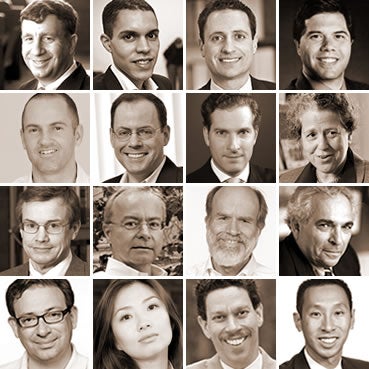From research on anti-corruption efforts to conferences on financial regulation
During the spring semester last year, although the students in a reading group at Harvard Law School in Cambridge and those in an advanced negotiation skills class at Renmin University of China Law School in Beijing were separated by some 6,700 miles, videoconferencing equipment and common interests easily bridged the distance. The students, taught by Professor William P. Alford ’77 in Cambridge and Alonzo Emery ’10, then an assistant professor at Renmin, came together electronically to consider the roles of China and the U.S. in a world order in flux. Read a story on the semester-long collaboration.
Alonzo Emery is now an instructor at the Harvard Negotiation and Mediation Clinic, directed by Clinical Professor Robert C. Bordone ’97, which has been involved in a series of projects in China over the past few years. They include an effort for Hewlett-Packard to improve worker grievance systems in two factories in the south. The clinic also developed trainings in negotiation skills—for environmental lawyers at the Beijing office of the Natural Resources Defense Council and for leaders of China’s top disabled persons organizations through Renmin University of China Law School’s Disability Law Clinic, where Emery was director. Work for the Renmin clinic continues and is now focused on access to education issues. The Renmin clinic was founded in 2011 with the assistance of the Harvard Law School Project on Disability, led by visiting professor Michael Stein ’88 and Professor William Alford. Read more.
For the past three years, the HLS International Human Rights Clinic has been investigating alleged human-rights violations by the Myanmar military in the eastern part of the country. “We are using the research to promote military reform and civilian protection in the country,” says Matthew Bugher ’10, who leads the project in consultation with Clinical Professor Tyler Giannini, the clinic’s director.
Professor Noah Feldman is the author of a recent work on U.S.-China relations, “Cool War: The Future of Global Competition” (Random House). In the book, he describes an “unprecedented historical situation” in which the U.S. and China “have at the exact same time a dynamic of cooperation and interdependence in the economic sphere, and a dynamic of conflict and diverging interests in the geopolitical sphere.” Read more.
In December, Professor Vicki Jackson attended an international conference in Seoul commemorating the 25th anniversary of the Constitutional Court of Korea. She spoke on “Welfare and the Role of Constitutional Adjudication: Economic Inequality and State Responsibility in the U.S.”
Over the past few years, Professor Howell E. Jackson ’82 has written several articles focusing on financial regulation in Asia, among other regions. He has also supervised J.D. and doctoral students who have pursued studies of securities enforcement and cross-border offering practices in Hong Kong and the People’s Republic of China.
Professor David Kennedy ’80 is co-editor of a new book on law and the economy in China, “Law and Economics with Chinese Characteristics: Institutions for Promoting Development in the Twenty-First Century,” with Joseph E. Stiglitz (Oxford). It includes contributions from Chinese and Western scholars. See “Other Recent Titles.”
Professor J. Mark Ramseyer ’82, an expert in Japanese law, is writing a book on tort litigation in Japan this year, during a sabbatical at the University of Tokyo.
Professor Hal Scott and his Program on International Financial Systems regularly convene high-level conferences between Asian and U.S. financial leaders, including an annual Japan-U.S. symposium. Speakers at this year’s event included Japan’s vice minister of finance and the chief U.S. economist for Morgan Stanley, as well as the head of financial regulation reform at Citi. Read more about the annual symposia.
Professor Matthew C. Stephenson ’03 is conducting a research project on anti-corruption law and institutions around the world. As part of this project, and with the support of the school’s newly established Asia Law Reform Initiative, he is studying the varying experiences of anti-corruption enforcement agencies in East and Southeast Asia.
Professor Jeannie Suk ’02 is the author of a memoir recently published in Korea. An expert in criminal law, family law, and the law of art, fashion, and the performing arts, Suk received the Pony Chung Innovation Award this year, given by the foundation established in memory of the late Hyundai Motor Co. founder.
Professor David Wilkins ’80 and his team at the Program on the Legal Profession have been investigating the impact of globalization on the corporate legal sector in China, India, and Brazil through the Globalization, Lawyers and Emerging Economies project.
Assistant Professor Mark Wu has recently focused on the growing use of anti-dumping duties by China against foreign imports. He has also conducted research on the implications of bilateral trade disputes involving China’s export restrictions on minerals and China’s industrial policy for its renewable energy sectors. In November, he spoke on the future of the WTO dispute settlement at the Chinese Academy of Social Sciences in Beijing.
